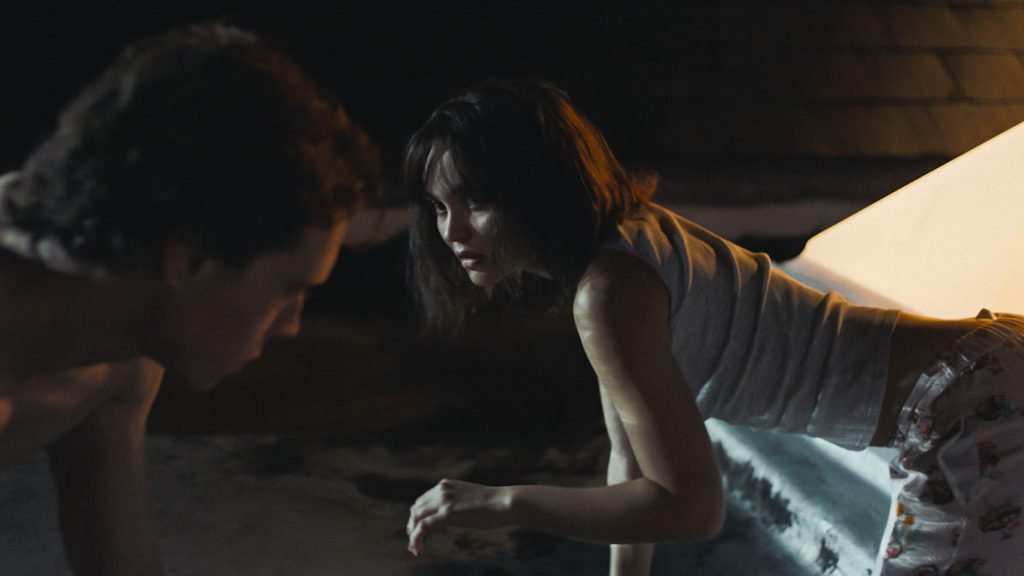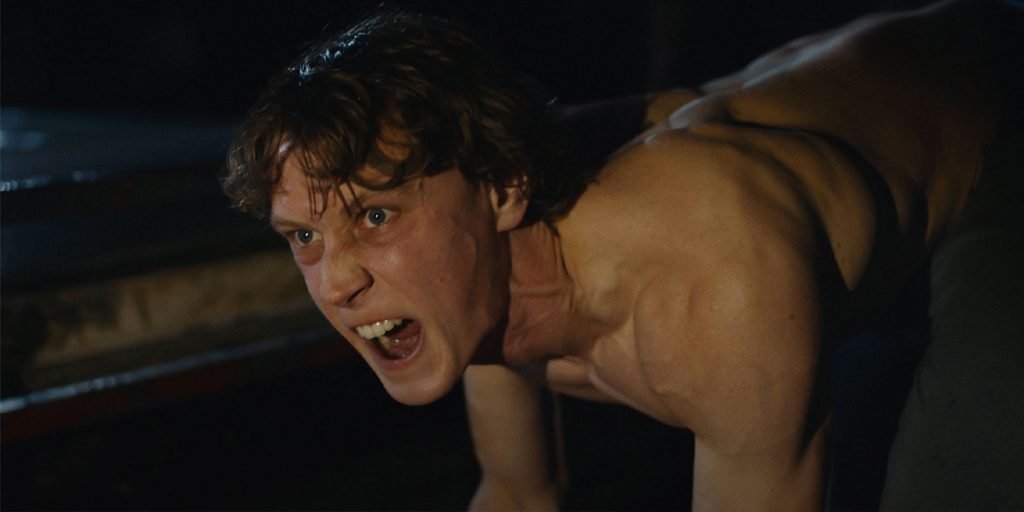Wolf approaches its potentially preposterous premise with affecting authenticity, drawing painful parallels to terrorized communities today.
In an industry inundated with sequels, spin-offs, reboots, and remakes, it’s rare to find a film that is undeniably unique, unable to be compared to anything else in the marketplace today – and that’s the first thing that sets Nathalie Biancheri’s Wolf apart from the pack (pun intended). While its psychiatric hospital setting and firm focus on adolescent anguish will likely draw comparisons to films like One Flew Over the Cuckoo’s Nest and Girl, Interrupted, Wolf’s peculiar premise is entirely its own thing, with subject matter and a story that has yet to be properly probed in cinema. At first, it might make you laugh. Species dysphoria? People who think they’re animals?
And yet, one of the most admirable aspects of Wolf is how Biancheri never leans into camp or comedy when characterizing her protagonists and their plights, always taking an authentic approach to investigating their identities and never finding fault with their feelings. It’s this complete – and courageous – commitment that makes such a seemingly preposterous plot feel resoundingly real when all is said and done, allowing us to empathize with leads who might have otherwise been seen as laughing stocks in another artists’ hands. In the end, Wolf may not be able to answer all the riveting questions it raises, but thanks to a pair of persuasive performances from George MacKay and Lily-Rose Depp – and Biancheri’s sensitive storytelling – it’s an immensely engrossing experience all the same.
Jacob (MacKay, of 1917 and Captain Fantastic) is a young man who believes – beyond any shadow of a doubt – that he is a wolf trapped in a human’s body. More than anything else, he longs to just roam wild in woods, free from the constraints of modern civilization and free to express himself and identify as he pleases, without hurting anyone. However, such a lifestyle will not be allowed by his mother and father, who send him to a psychiatric clinic that specializes in treating those with “species dysphoria” – the belief that you were meant to live as an animal, despite being born as a human.
Here, Jacob encounters and befriends a fellow teenage boy who identifies as a German shepherd (Fionn O’Shea, of Cherry and Dating Amber), another who says that he’s a squirrel (Darragh Shannon), and an adolescent girl who proclaims to be a parrot (Lola Petticrew, also of Dating Amber and Here Are the Young Men), among others. During the day, they’re overseen by a diligent but often drained therapist (Eileen Walsh, of The Magdalene Sisters and Nicholas Nickleby), but the entire compound is controlled by the clinic’s horrifying head, known only as “The Zookeeper” (Paddy Considine, of In America and The World’s End), who subjects his clients to cold and cruel “curative” therapies. Ultimately, Jacob’s only true source of solace here proves to be a promising connection he forms with a cryptic young woman called “Wildcat” (Lily-Rose Depp, of The King and Voyagers), with her feline persona endlessly fascinating him as the two struggle to survive – and potentially plan an escape.

Perhaps the most moving element of Wolf is its overarching metaphor relating those with species dysphoria to outsiders and nonconformists in our modern society – specifically, those in the trans community. These similarities aren’t subtle (it’s not hard to pick up on the parallels between The Zookeeper’s pernicious practices and those utilized in conversion therapy for instance, and the comments about the teens’ “immoral” and “unnatural” lifestyles are terribly timely), but that doesn’t make them any less aggravating. It’s piercingly painful to witness the way these characters have their souls stripped from them in the name of preserving and promoting “normalcy,” by any means necessary.
Biancheri continually – and intelligently – interrogates the lengths that some will go to to snuff out anything “untraditional” or “foreign” in society, with no care at all for the very real human cost, and even though The Zookeeper’s evilness could’ve been too exaggerated when depicted by any other writer-director, she roots his rage and repugnance in realism, making him an all too relatable antagonist. Wolf does leave some loose ends by the credits roll, especially when it comes to connecting its ideas – and their thematic equivalent in our world – as clearly as they could be, and it ends a bit too abruptly (it’s the rare 90-minute movie that could benefit from an extra 15-20 minutes), but it’s terrifically thought-provoking throughout regardless, and Biancheri’s ambition alone is absolutely admirable.
It helps too that Biancheri is assisted by two tremendously thrilling turns from MacKay and Depp, with both fully throwing themselves into these tough roles and never looking back, completely committing to the pathos of the piece and the personas that their parts require. This is perhaps the best work of MacKay’s career yet in fact, delivering an even more physically demanding performance than what was asked of him in 1917, entirely inhabiting the identity of a wolf and mastering these animalistic mannerisms.
His earlier repression of his inner inclinations is also quite ravishing, but it’s this rigorous realization of Jacob’s natural state that mesmerizes us most, treating him with tenderness but also staying true to a wolf’s savageness as he digs deeper into Jacob’s distress. Though Depp has fewer film credits to her name, she’s equally essential to the effectiveness of their relationship, first by also alluring us with her felinity as Wildcat (appearing both comely and cagey, simultaneously) and later by captivating us with her crafty chemistry with MacKay’s Jacob. Additionally, as Depp is asked to depict the distinctive differences between Wildcat and Jacob as she finds herself unable to accept her true self as fully as he has, she does so with stirring sorrow, straining to reach his place of self-actualization but coming up short.
Biancheri’s direction is as beguiling as her moving musings on the dolor of the downtrodden and degraded communities she seeks to support here, capturing the eerie environment of The Zookeeper’s domain with a crisp – and chilling – cleanness that immediately calls to mind the aforementioned Cuckoo’s Nest and Girl, Interrupted. It proves to be the perfect backdrop to the brutality Paddy Considine exhibits in his petrifying performance too, with his causticity contrasting with the clinic’s coldness in frightening fashion – and scariest of all is his ability to switch from callousness to cordiality on a dime, charming the parents of the very patients he abuses when the lights go low and no witnesses are watching.
If nothing else, by the time Wolf reaches its rapid but rich resolution, it’s The Zookeeper’s horrifying lack of humanity, MacKay and Depp’s potent poignancy in their parts, and Biancheri’s extensive empathy for her characters and conditions that will linger long after you leave the theater, providing you with much to ponder in the weeks that follow. Even if Biancheri’s contemplations don’t always come together as completely as they could, they’re always utterly absorbing, and it’s refreshing to still see such original art brought to the big screen.
Focus Features will release Wolf in US theaters on December 3, 2021.

